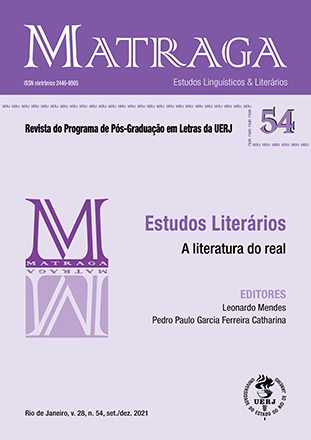Maria dos Canos Serrados (2013), by Ricardo Adolfo, and the pulp recreation of reality
DOI:
https://doi.org/10.12957/matraga.2021.58437Keywords:
Portuguese literature, Realism, Novel, Ricardo Adolfo.Abstract
This article analyses the novel Maria dos Canos Serrados (2013), by Ricardo Adolfo, aiming to understand the ways realism presents itself in 21st century’s Portuguese fiction. One perceives a change of meaning of the term realism in the scope of Portuguese literature, understood as a portrait of reality (in the 19th century), as an activist questioning of reality (with neorealism, in the 20th century) and as a resource in favor of the novel’s narrativity (21st century). Characterized by the dynamic rhythm that befits a cinematographic narrative and making use of space, denomination (according to Cassirer) and narrative implausibility (according to Santo Agostinho and Todorov), Ricardo Adolfo’s work presents the current diseases of society, in a social realism and pulp aesthetics that stand apart from the main strands of contemporary Portuguese novel.
Downloads
Downloads
Published
How to Cite
Issue
Section
License
Authorization
Matraga – Scientific Journal of the Post-graduate Program in Arts and Humanities of UERJ is authorized to publish the article submitted here, if it is accepted for online publication. It is attested that the contribution is original, that it is not being submitted to another publisher for publication, and that this statement is the expression of truth.
The works published in Matraga's virtual space – Scientific Journal of the Post-graduate Program in Arts and Humanities of UERJ will be automatically transferred, and your copyright is reserved to Matraga. Its reproduction, in whole or in part, is conditional on the citation of the authors and the data of the publication.

Matraga uses license Creative Commons - Attribution-Non-Commercial 4.0 International.





